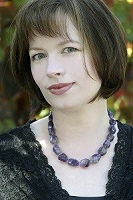Unexplained Fevers by Jeannine Hall Gailey builds on the poet’s exploration of popular myths and legends centered on women, only unlike Becoming the Villainess (my review) where the characters become vengeful, these characters are striking out for parts unknown, examining their legends, and telling the real tales behind the fairy magic. From Jack and Jill who vowed to stay together against all odds who find themselves in Ohio to Alice in Wonderland who merely gets lost in a coat closet, Gailey is poking fun at the fantasies that rely on women being beautiful and little else to prove their worth. These heroines are set free, and outside the confines of their tales, they are able to contemplate their past choices and their futures in ways they never though possible.
She Had Unexplained Fevers (page 3) some nights she just wasn't herself, skin pale and damp as a child's they lay her in a glass coffin told me there was something in her throat and I said yes we've all swallowed a lot of crap choked down broken promises like apple.
In looking at these tales, Gailey is not only calling into question their validity but also their impact on the generations that have read them. Are women supposed to be only beautiful and only want that prince to come rescue them? And by the end of the collection, the poet asks readers to think about how much has changed even in the modern world. May be there are few princes with castles and white steeds, but don’t they have other “enticements” like good paying jobs and the house in the suburbs that women continue to gravitate towards as safe and what they should want from their lives?
Like “Alice, Through the Looking Glass,” there are poems that are more universal and do not stick as closely to the stories as some other poems do, and in these poems, Gailey raises questions about body image and the prevalence of women in advertising to not only sell products, but also to sell an idea of what beauty is and should be for every woman. The narrator in “Alice” asks, “What am I doing here in this white room/with no smell but dust and soap//” Meanwhile, Snow White asks the reader in “I Like the Quiet: Snow White” to get her out of our own looking glasses — break free from the need for a certain appearance — readers would see their true selves and who each of us really is and how we matter without the constant need to live up to a beauty standard. Snow White is just like all of us, wanting to spend time alone, wanting space to decide the course of our lives, wanting not to rush into a marriage even with a prince, and all the trappings and decisions we make in our lives.
Unexplained Fevers by Jeannine Hall Gailey easily parallels the myths and stories we’ve read and memorized as children with the current modern lives we lead. Though lest you think all of the poem narrators are female, there are male narrators, including one knight who did not get the fairytale ending he was expecting. In this way, Gailey is calling into question the fantasies that men are fed as children as well; must they be rescuers and be the strongest and bravest to get the girl? A phenomenal collection from beginning to end — one that has a permanent place in my library, right next to her others.

Jeannine Hall Gailey is the Poet Laureate of Redmond, WA and the author of Becoming the Villainess, She Returns to the Floating World, and Unexplained Fevers, available spring of 2013. Her work has been featured on NPR’s The Writer’s Almanac, Verse Daily, and The Year’s Best Fantasy and Horror. Her poems have appeared in The American Poetry Review, The Iowa Review, and Prairie Schooner. She teaches part-time at National University.





You’ve made me curious about this collection. It sounds very good.
I have one more of her collections to review…
Permanent place in your library?! WANT. I have an e-galley of this via NetGalley — not sure if it is expired — but I’m going to try to get to this before it does now. I adore the cover and the bit you shared — so intriguing!
I really liked this, and if you like it, you’ll like Becoming the Villainess.